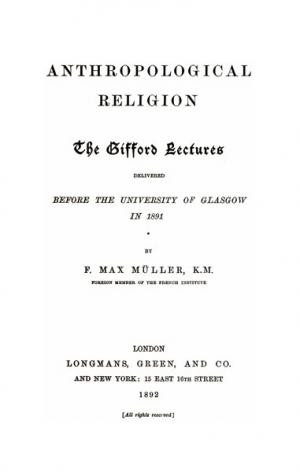Anthropological Religion, F. Max Müller’s third course of Gifford Lectures, concerns the study of that historical manifestation of natural religion founded upon the nature of man; more precisely, upon the discovery of some divine or infinite character within man, beyond the material body. Through the comparative study of conceptions of the soul and the afterlife, Müller considers instances of ancestor worship as likely the earliest indication of humankind’s recognition of something not merely human, something not far removed from the divine, in man. This idea, which developed spontaneously and, according to Müller, universally and inevitably, is brought to its fullest and truest realization in Christianity, in the human and divine natures of Jesus Christ, who relates to the Supreme Being as ‘Father’.
Anthropological Religion
Books
Anthropological Religion
Lecture 1. On Freedom of Religious Discussion.
Lecture 3. Summary of the Results of Physical Religion.
Lecture 4. The Historical Proof of the Existence of God.
Lecture 5. About the True Character of Ancestor-Worship.
Lecture 6. The Untrustworthiness of the Materials for the Study of Religion.
Lecture 7. The Discovery of the Soul.
Lecture 8. Discovery of the Soul in Man and in Nature.
Lecture 9. Funeral Ceremonies.
Lecture 10. What Was Thought About the Departed.
Lecture 12. What Does It Lead To?

Throughout his lectures, Müller has tried to prove that a belief in God, in the immortality of the soul and in a future retribution can be gained by the right exercise of human reason unassisted by miracles or special revelation. Having apparently become the object of much criticism in the wake of his first two courses of Gifford Lectures, in the preface to Anthropological Religion, his third course of lectures, Müller ardently defends all that he has previously taught to the public, refusing to retract a single word.
- Brannon Hancock, University of Glasgow
- Sara Abraham, University of Glasgow


